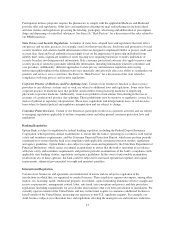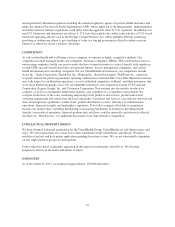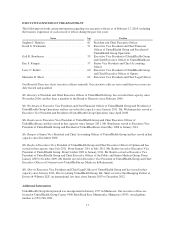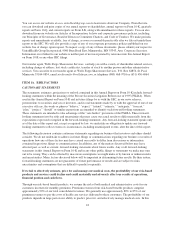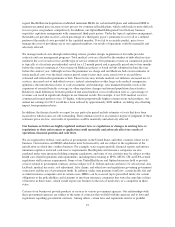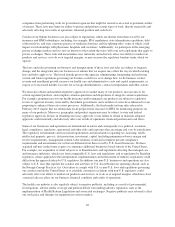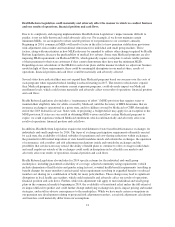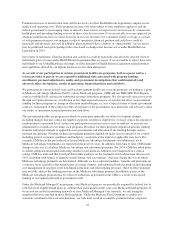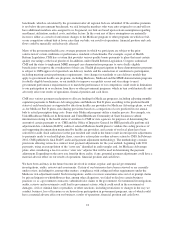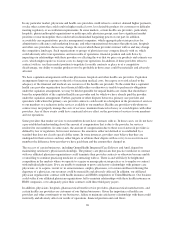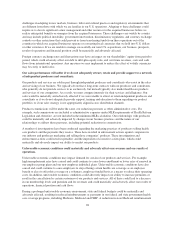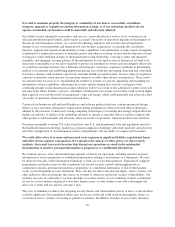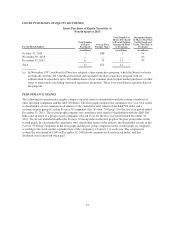United Healthcare 2013 Annual Report Download - page 27
Download and view the complete annual report
Please find page 27 of the 2013 United Healthcare annual report below. You can navigate through the pages in the report by either clicking on the pages listed below, or by using the keyword search tool below to find specific information within the annual report.regulations. In addition, federal and state legislatures regularly consider new regulations for the industry that
could materially and adversely affect current industry practices, including the receipt or disclosure of rebates
from pharmaceutical companies, the development and use of formularies, and the use of average wholesale
prices.
Our PBM businesses would be materially and adversely affected by an inability to contract on favorable terms
with pharmaceutical manufacturers and other suppliers, and could face potential claims in connection with
purported errors by our mail order or specialty pharmacies, including in connection with the risks inherent in the
packaging and distribution of pharmaceuticals and other health care products. Disruptions at any of our mail
order or specialty pharmacies due to an accident or an event that is beyond our control could affect our ability to
process and dispense prescriptions in a timely manner and could materially and adversely affect our results of
operations, financial position and cash flows.
In addition, our PBM businesses provide services to sponsors of health benefit plans that are subject to ERISA.
The DOL, which is the agency that enforces ERISA, could assert that the fiduciary obligations imposed by the
statute apply to some or all of the services provided by our PBM businesses even where our PBM businesses are
not contractually obligated to assume fiduciary obligations. In the event a court were to determine that fiduciary
obligations apply to our PBM businesses in connection with services for which our PBM businesses are not
contractually obligated to assume fiduciary obligations, we could be subject to claims for breaches of fiduciary
obligations or claims that we entered into certain prohibited transactions.
If we fail to compete effectively to maintain or increase our market share, including maintaining or
increasing enrollments in businesses providing health benefits, our results of operations, financial position
and cash flows could be materially and adversely affected.
Our businesses compete throughout the United States and face significant competition in all of the geographic
markets in which we operate. In particular markets, our competitors, compared to us, may have greater
capabilities, resources or market share; a more established reputation; superior supplier or health care
professional arrangements; better existing business relationships; or other factors that give such competitors a
competitive advantage. In addition, our competitive position may be adversely affected by significant merger and
acquisition activity that has occurred in the industries in which we operate, both among our competitors and
suppliers (including hospitals, physician groups and other care professionals). Consolidation may make it more
difficult for us to retain or increase our customer base, improve the terms on which we do business with our
suppliers, or maintain or increase profitability. Our business, results of operations, financial position and cash
flows could be materially and adversely affected if we do not compete effectively in our markets, if we set rates
too high or too low in highly competitive markets, if we do not design and price our products properly and
competitively, if we are unable to innovate and deliver products and services that demonstrate value to our
customers, if we do not provide a satisfactory level of services, if membership or demand for other services does
not increase as we expect or declines, or if we lose accounts with more profitable products while retaining or
increasing membership in accounts with less profitable products.
If we fail to develop and maintain satisfactory relationships with physicians, hospitals, and other health
care providers, our business could be materially and adversely affected.
We contract with physicians, hospitals, pharmaceutical benefit service providers, pharmaceutical manufacturers,
and other health care providers for services. Our results of operations and prospects are substantially dependent
on our continued ability to contract for these services at competitive prices. Any failure to develop and maintain
satisfactory relationships with health care providers, whether in-network or out-of-network, could materially and
adversely affect our business, results of operations, financial position and cash flows. In addition, certain
activities related to network design, provider participation in networks and provider payments could result in
disputes that may be costly, distract managements’ attention and result in negative publicity.
25


